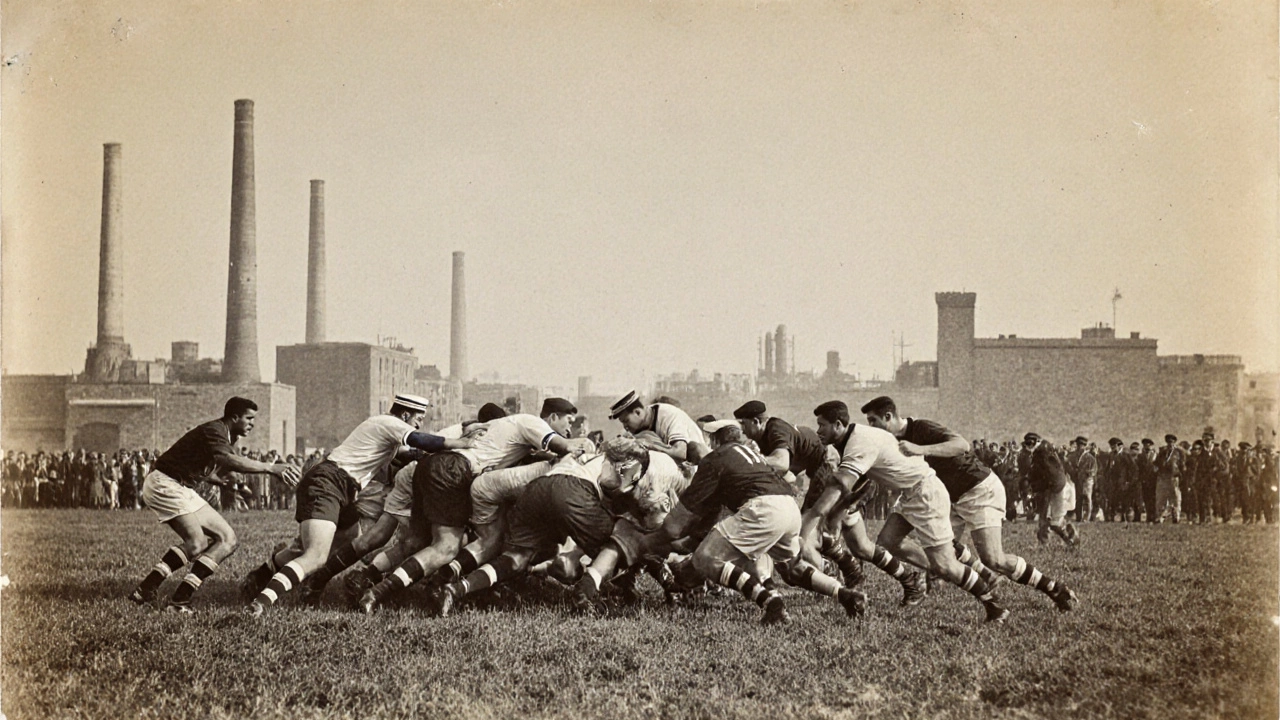Quick Takeaways
- Italians simply use the word rugby for the sport, just like English speakers.
- The term “rugby a 15” refers to rugby union, while “rugby a 13” indicates rugby league.
- The Italian Rugby Federation (FIR) governs the game and helped Italy join the Six Nations in 2000.
- Pronouncing the Italian word is easy - roo‑g‑bee with a rolled “r”.
- Understanding the local jargon helps you follow fixture lists, media coverage, and fan chatter.
When you hear the word rugby spoken in Italy, it’s the exact same term you use in English - no fancy translation required. The sport arrived on the Italian peninsula in the early 20th century, and the language simply borrowed the English name, adapting the pronunciation to fit Italian phonetics. In everyday conversation, fans, commentators, and officials all say “rugby”. If you’re tracking fixtures on an Italian website or listening to a match broadcast, you’ll hear that word repeated over and over.
Why the Word Didn’t Change
Many sports get a local nickname when they travel across borders - think “football” becoming “soccer” in the U.S. Rugby, however, kept its original name for a few reasons:
- Italy adopted the sport from British sailors and schoolboys who already used the English term.
- There was no existing Italian word that captured the same meaning, so borrowing felt natural.
- The governing body, Italian Rugby Federation (FIR), chose to keep the English spelling in its official documents, reinforcing consistency.
The result? “Rugby” entered the Italian lexicon unchanged, only the pronunciation shifted to match Italian phonology - roo‑g‑bee with a crisp rolled “r”.
Historical Snapshot: Rugby’s Arrival in Italy
Rugby first appeared in Italy around 1910, thanks to expatriate British workers in the industrial north. The earliest clubs formed in Turin and Milan, and the sport spread through university circles in Rome and Naples. By the 1920s, regional tournaments were organized, and the first Italian national team played its debut match against France in 1929.
World War II interrupted the growth, but the post‑war era saw a resurgence. In 1945 the Italian Rugby Federation (FIR) was officially founded, cementing the sport’s administrative structure. The federation joined the global body World Rugby in 1987, paving the way for Italy’s inclusion in major international competitions.
The Role of the Italian Rugby Federation (FIR)
The FIR - known in Italian as “Federazione Italiana Rugby” - is the central authority for all things rugby in the country. Its responsibilities include:
- Organizing domestic leagues such as the Top12 (now called Italian Top10).
- Managing the national squads for both Rugby Union and Rugby League.
- Coordinating Italy’s participation in the Six Nations Championship, the premier annual European tournament.
- Developing grassroots programs, coaching certifications, and youth academies across the country.
Because the FIR kept the English name, every official communication - fixture lists, press releases, and match reports - uses “rugby” without translation.

Union vs. League: The “a 15” and “a 13” Labels
In Italy, a subtle distinction is made when people need to specify the code:
- Rugby a 15 - literally “rugby of 15”, referring to Rugby Union. This is the form played in the Six Nations and the Rugby World Cup.
- Rugby a 13 - “rugby of 13”, indicating Rugby League, a faster, fewer‑player variant.
These qualifiers help fans differentiate when the context isn’t obvious. For example, a headline might read “Italia v. Francia - Rugby a 15” to clarify that it’s a union match.
How the Term Appears in Italian Media
Italian newspapers, TV channels, and online sports portals all use the same word. A typical match preview on Corriere dello Sport will start with:
"Il prossimo sabato, l’Italia affronta la Francia in rugby a 15, partita valida per il Sei Nazioni."
Live commentary will hear phrases like “ecco la mischia” (the scrum) and “lancio del pallone” (kick of the ball), but the sport itself is always called “rugby”. Social media hashtags follow suit: #Rugby, #RugbyItalia, #SixNations.
Pronunciation Guide for Travelers
If you’re a visitor to an Italian stadium, here’s a quick cheat sheet:
- R - rolled, like in “Roma”.
- U - short “oo” as in “boot”.
- G - hard “g” as in “go”.
- B - like the English “b”.
- I - “ee” as in “see”.
Put it together: roo‑g‑bee. Saying it correctly earns you instant street‑cred among local fans.
Quick Reference Table
| English term | Italian term | Notes / Usage |
|---|---|---|
| Rugby (general) | rugby | Used for both union and league unless specified. |
| Rugby Union | rugby a 15 | Official Six Nations, World Cup, domestic Top10. |
| Rugby League | rugby a 13 | Less common, but growing in northern regions. |
| National team (union) | Gli Azzurri (rugby) | Nickname derived from the famous Italian football squad. |
| Domestic league (top tier) | Top10 (precedently Top12) | Professional clubs like Zebre and Benetton. |

Common Misconceptions
1. “Italians call rugby ‘rugby’ in English, but they have a different word in Italian.” - False. The word is identical; only the pronunciation changes.
2. “All Italian rugby is rugby union.” - Not quite. While union dominates, a small but active league community uses the “rugby a 13” label.
3. “You need to learn a whole new set of terms to understand Italian match reports.” - Mostly untrue. Most tactical terms (misia, touche, meta) are borrowed directly from English or share Latin roots, and they appear the same in Italian.
Tips for Following Italian Fixtures
- Check the FIR’s official calendar (federugby.it) for dates, venues, and whether a match is “a 15” or “a 13”.
- Look for the hashtag #RugbyItalia on Twitter and Instagram to catch live commentary.
- Listen for the word “rugby” in TV broadcasts - it signals the sport, while qualifiers tell you the code.
- If you’re buying tickets, the venue’s website will state the competition (Six Nations, Top10, etc.) which also hints at the type of rugby.
Mini‑FAQ
Do Italians have a different word for rugby?
No. The sport is called “rugby” in Italy, just like in English. Only the pronunciation adapts to Italian phonetics.
What does “rugby a 15” mean?
It’s the Italian way of saying “rugby union”, the 15‑player version played in the Six Nations and the Rugby World Cup.
Is there a professional rugby league in Italy?
Yes, though it’s smaller than union. The Italian Rugby League Championship features clubs primarily in the north, and matches are labeled “rugby a 13”.
How can I pronounce “rugby” like an Italian?
Say roo‑g‑bee with a rolled “r” and a short “oo”. It sounds almost identical to the English word, just with Italian emphasis.
Where can I find the Italian rugby fixture list?
The official FIR website (federugby.it) posts up‑to‑date schedules for the Six Nations, Top10, and domestic cup competitions. Sports news sites like Gazzetta dello Sport also list matches under the “rugby” section.
Wrap‑Up
So, next time you skim an Italian sports headline and see the word “rugby”, you’ll know there’s no hidden translation - it’s the same sport you love, just spoken with an Italian accent. Whether you’re tracking the Azzurri in the Six Nations, cheering on a local Top10 club, or exploring the niche league scene, the terminology stays consistent. Armed with this knowledge, you can follow fixtures, join fan chats, and even order a “birra” while shouting “Forza Azzurri!” at the stadium. Welcome to Italian rugby - it’s called exactly what you thought, only the pronunciation is a bit more musical.
